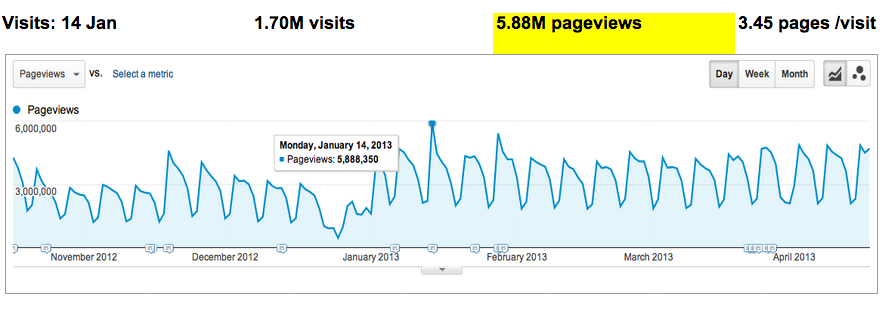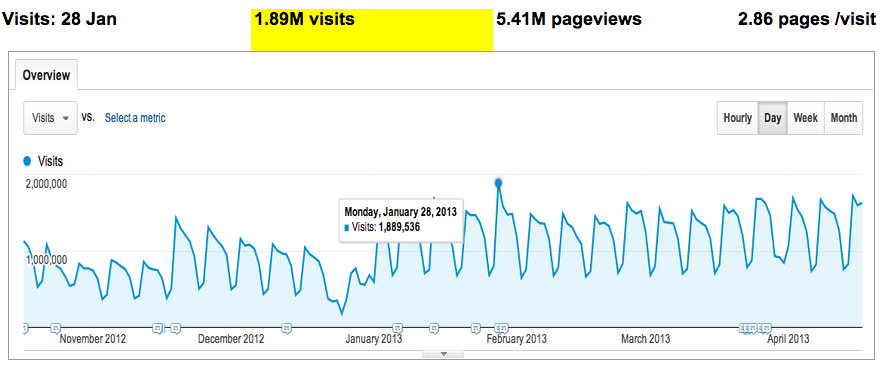Launched on 17 October 2012, GOV.UK has just celebrated 6 months of being live. In that time it's received 188 million visits and 546 million pageviews; and over 9 million searches have been made on the site.
But what was the busiest day in those 6 months? Well, it depends on what you measure.
Pageviews
Let’s start with pageviews. A pageview is counted, well...every time a page is viewed. So, if a visitor clicks reload after reaching the page, this is counted as an additional pageview. If a user navigates to a different page and then returns to the original page, a second pageview is recorded as well.
On 14 January, GOV.UK had the most pageviews in a day in its first six months. There were 5.88 million pageviews and 1.70 million visits. Why was this? On that date the government announced changes to state pensions and so there was a spike in traffic to GOV.UK's State Pension calculator page.
Now this is a Quick Answer calculator. To get an answer, people need to anonymously respond to a series of questions and each stage of doing this counts as a new pageview. So there were about 6 pageviews for each of this type of visit, boosting the total pageview count for the day.
Visits
A visit is an interaction by an individual with a website where their browser requests one or more pageviews. If an individual has not taken any other action on the site within a specified time period (30 minutes in GOV.UK’s case), that visit is considered as completed.
On 28 January GOV.UK had the most visits in a day in its first six months. There were 1.89 million visits and 5.41 million pageviews. On this day, the Department for Transport announced the High Speed Rail 2 route and this was the second most viewed page after Find a job with Universal Jobmatch. However, there were only about 2.3 pageviews per visit. People were coming in, reading what they were looking for, and leaving.
I then used two other metrics to correlate this data:
Visitors
Unique visitors is the best count provided by our analytics package of the number of individuals who visit a site. All activity from a visit within a timeframe (30 minutes in GOV.UK’s case), is counted as belonging to 1 unique visitor.
Unique pageviews
This measure combines all the pageviews that were generated by the same visitor, during the same visit.
Result? 14 January had 1.38m visitors and 3.71m unique pageviews.
28 January had 1.54m visitors and 3.82m unique pageviews.
Some conclusions
On most measures, 28 January was the busiest day in GOV.UK's first 6 months. It’s interesting to see that the content on the High Speed Rail 2 route was so much more popular than other content belonging to departments, which had moved to GOV.UK in the same period. It shows the power of a big story with lots of media interest. Its also shows the success of the Department for Transport’s approach of promoting the policy. They focussed on providing the data and making sure all the information and links were live on time.
But from an analyst’s point of view, the big lesson to share is to be aware of what data you are choosing to look at before jumping to conclusions. Do some cross-checking so you have additional information and context to inform your interpretations.




2 comments
Comment by K Heath posted on
Pity the new web site provides links to lots of false information about council taxation law, ,together with some publications by government agencies misrepresenting that law, apparently copied from original produced by Experian Ltd of Nottingham who have been misrepresenting it for a number of years now.
https://www.gov.uk/apply-for-council-tax-discount
Whoever wrote the material here appears to have copied from some other legally incorrect document. For example, it contains the hoary old nonsense about full council tax being based upon two residents. This is nonsense: full council tax is based upon the local council tax rate and the valuation band of the property.
Many of the links lead to false information; specifically information to the effect that there is something called a 'single person discount' as opposed to a 'disregard' discount and that the law requires you to tell the council if you are changing from one to another. This is not what the law (eg regulations 15, 20(3)(f) and 16 say (though it appears to be the attitude taken by Experian, who otherwise could not make so much money out of their council tax discount products).
I have asked the Department for Communities to take action on this; one can only hope it happens sooner rather than later.
I pointed out the mistakes via the contact number on the web site itself: this appears to be a waste of time. I don't suppose the people who do the web site know the first thing about council taxation law.
In the meantime, on the basis that this site provides links to false information and contains false/misleading information I shall not be relying on material I find on it.
Comment by jesssle posted on
Thanks for sharing, agree that context is everything when considering data.